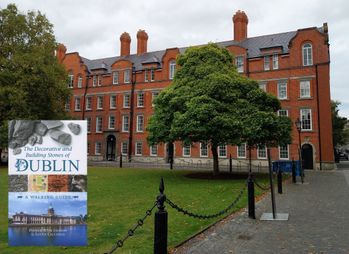
Unearthing Dublin’s Geological Heritage with Trinity College’s New Guide
Trinity College Dublin invites you to discover the hidden geological wonders beneath Dublin’s iconic cityscape with their newly published walking guide, “The Decorative and Building Stones of Dublin.” This book, authored by Trinity College geologists, offers a unique perspective on Dublin’s built heritage, revealing the fascinating stories etched in the very stones of its buildings and monuments. Whether you’re a seasoned geologist, a curious resident, or a visitor eager to delve deeper into Dublin’s history, this guide promises an enriching journey through time.
Embark on a Geological Adventure Through Dublin’s Streets
This comprehensive guide features ten meticulously crafted walking trails, each leading you on a two-hour exploration of Dublin’s architectural gems. From grand monuments to weathered structures, each site unveils a captivating narrative intertwined with geological and architectural significance. The guide provides detailed maps and insightful descriptions, making it easy to follow the trails and uncover the geological secrets embedded within Dublin’s urban fabric. One trail even focuses exclusively on Trinity College’s historic campus, allowing you to witness firsthand the geological tapestry woven into the university’s iconic buildings.
Unveiling the Stories Behind Dublin’s Building Stones
Dublin’s architectural splendor owes its unique character to the diverse array of stones used in its construction. “The Decorative and Building Stones of Dublin” meticulously documents over 170 stone types sourced from local quarries and beyond. The book showcases the craftsmanship of quarrymen, builders, and architects who shaped Dublin’s landscape using limestone, granite, sandstone, slate, marble, and imported stones. By understanding the origins and characteristics of these materials, you gain a deeper appreciation for the city’s rich architectural heritage. The book also sheds light on the historical context and significance of each building, providing a holistic understanding of Dublin’s evolution.
A Collaborative Effort to Preserve Ireland’s Stone Heritage
“The Decorative and Building Stones of Dublin” is a testament to the dedication of Trinity College Dublin’s geologists and the collaborative efforts of various organizations. The book is a product of the STONEBUILT Ireland project, generously funded by prominent research institutions committed to preserving Ireland’s geological heritage. This project underscores the importance of understanding and appreciating the natural resources that have shaped Ireland’s built environment. The guide not only serves as a valuable resource for walkers but also contributes to ongoing research and conservation efforts.
Tracing the Footsteps of Geological Pioneers at Trinity College
The authors of the guide, Professor Patrick Wyse Jackson and Dr. Susannah Caulfield, bring a wealth of expertise to this project. Professor Wyse Jackson, a Member of the Royal Irish Academy and Professor of Geology at Trinity College, leads research on dimension and decorative stone as part of the STONEBUILT Ireland project. Dr. Caulfield, a Trinity College alumna with a PhD in the exploitation of decorative stone in Victorian Ireland, contributes her extensive knowledge of historical building practices. Their combined expertise ensures the guide’s accuracy and provides readers with a unique insight into the geological history of Dublin. The guide is available for purchase at the Trinity College Library Shop.
Interested in studying at Trinity College? Contact Studygram to learn more about available programs and how we can help you with the application process.

